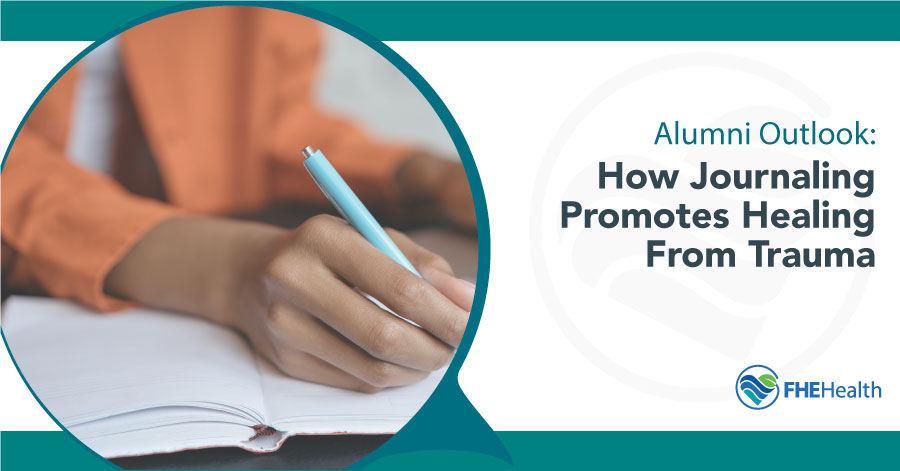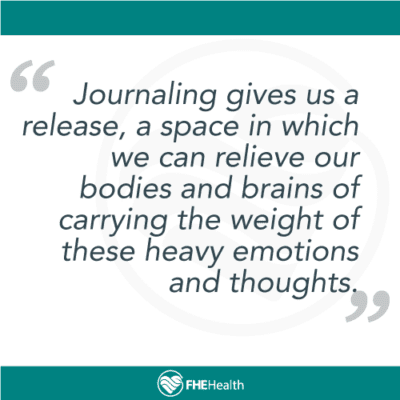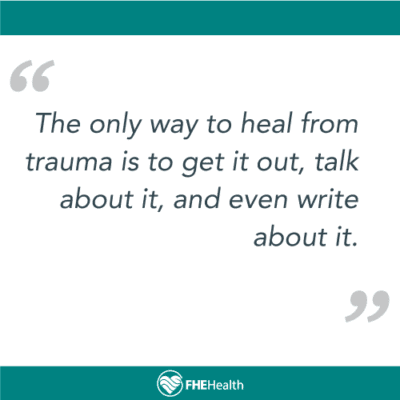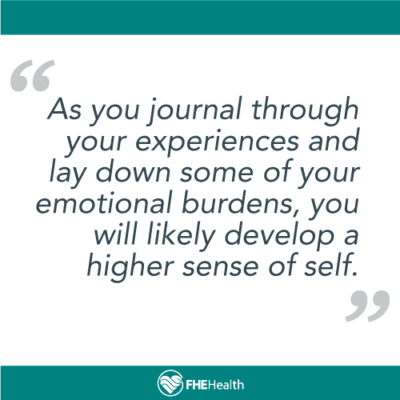
 Journaling is a method in which we can express and release thoughts and emotions. When our brains become overwhelmed with attempting to process and store stress and other traumatic situations – it takes a toll. Journaling gives us a release, a space in which we can relieve our bodies and brains of carrying the weight of these heavy emotions and thoughts. One of the most critical components of journaling, for me, is the ability to be completely honest without judgment. I am then able to go back and reflect on some of the things I’ve written and process these events without the overload of stressful feelings taking over.
Journaling is a method in which we can express and release thoughts and emotions. When our brains become overwhelmed with attempting to process and store stress and other traumatic situations – it takes a toll. Journaling gives us a release, a space in which we can relieve our bodies and brains of carrying the weight of these heavy emotions and thoughts. One of the most critical components of journaling, for me, is the ability to be completely honest without judgment. I am then able to go back and reflect on some of the things I’ve written and process these events without the overload of stressful feelings taking over.
Furthermore, the act of writing requires access to our left brain. This section of the brain is responsible for our rational and analytical thinking, whereas the right brain is creative, emotional, and intuitive. As the left side of our brain is occupied with the act of writing, the right side of our brain can access emotions and our intuitive thoughts. This is a recipe for beautiful and healing creativity.
My Personal Experience with Post Traumatic Stress Disorder (PTSD) and Creative Writing
Journaling has been a part of my life for as long as I can remember – even long before I ever picked up a drink or a drug. I remember sitting in my room with my purple fuzzy, locked, journal writing endless entries about how horrible my parents were and updates with my latest crushes. Pen to paper created a world in which I could escape from the woes of my adolescent years. I remember my parents sending me to my room, and the first thing I would do was grab my journal and let all of my seemingly impossible emotions flow. Fortunately, this coping mechanism has followed me well into my adult years and is now one of my greatest assets in combating the remnants of the traumatic events I’ve experienced.
It seems as if it was just yesterday that I was so far removed from reality and self-medicating to avoid any form of “facing the music.” The oh-so-familiar escape I found with a pen in hand became lost to the bottom of a pill bottle and an empty glass of vodka. I was no longer seeking reprieve by way of walking through painful experiences and seeking healing – I was skipping down the path of utter oblivion. I won’t lie and say that this method didn’t work; it did. I was able to drink and drug myself numb for an extended period of time. However, that genius idea worked until it didn’t work anymore. Not only was I still left with the unhealed wounds of trauma, but I was also creating new lesions with each passing day as I ventured down the road of full-blown addiction.
I remember the day that I got onto the plane, heading for South Florida to attend treatment at FHE Health. I was a sad, scared little girl. I was walking away from a four-year bender and a lifetime of painful memories. No longer numbed with drugs and alcohol, I picked up my journal and began writing on the plane. My hands were sweaty and shaking as the anxiety continued to engulf me. I was leaving behind my son, the only home I’d ever known, and venturing into a foreign place with no roadmap – I began writing.
Almost instantaneously, the overwhelming feeling of impending doom began to subside. My thoughts and feelings were held captive by the paper and no longer imprisoned in my mind. This became a new crutch for me long into my journey into sobriety. I remember waking up every morning and writing an entry as the sun came up and I sipped coffee with the other recovering women surrounding me. I began making sense of the years I swore I lost to my chaotic lifestyle. I became more aware of how far off the scale I had fallen and my part in constructing the unmanageable life I was living. I was able to write down every fearful, frustrating, and desperate moment I experienced in treatment.
Fast forward to five years sober this month, and the same benefits that I received from journaling in my early sobriety days have multiplied. I can write freely without the self-condemning narrative blocking my flow. I know more about myself today than I ever knew before. I have found my faults, and I continue to work on them. I have found the unhealthy thoughts that lead to patterns and ultimately propelled this vicious cycle of trauma. The most beautiful part about all of this, I now write for a living. I get the gracious opportunity to share my painful experiences with others in hopes that my mistakes teach them long before they venture down the same path I did. I have the gift of connecting with other humans that share the same common bond of pain and hand in hand; we get to heal together.
Healing Benefits of Journaling
 Trauma has a funny way of rushing in and demolishing everything in its path. The threads of trauma often become intricately intertwined with the very essence of our being if we do not properly heal. We may react to situations or even subconsciously seek out traumatic people, places, and things when we are living in the throes of PTSD. The only way to heal from trauma is to get it out, talk about it, and even write about it. Here are a few of the many benefits of journaling and healing from trauma.
Trauma has a funny way of rushing in and demolishing everything in its path. The threads of trauma often become intricately intertwined with the very essence of our being if we do not properly heal. We may react to situations or even subconsciously seek out traumatic people, places, and things when we are living in the throes of PTSD. The only way to heal from trauma is to get it out, talk about it, and even write about it. Here are a few of the many benefits of journaling and healing from trauma.
Finding Clarity
Journaling has a beautiful way of helping us unpack deep, emotional traumas. Writing helps you to process your feelings on a specific subject or event. Putting pen to paper gives you the opportunity to express your thoughts and feelings safely and honestly. Often, victims of trauma have a difficult time making sense and remembering a series of events or even an extended period of time. Writing can help us find clarity and process our emotions less chaotically.
Increasing Self-Awareness and Confidence
 As you can gain more clarity from putting your thoughts and feelings onto paper, the natural by-product is gaining more knowledge of yourself. Increasing your self-awareness can help break age-old patterns of unhealthy thoughts and behaviors that often contribute to the vicious cycle of trauma. As you journal through your experiences and lay down some of your emotional burdens, you will likely develop a higher sense of self. This process alone can help dismantle unhealthy narratives and increase self-confidence. Increasing self-awareness and self-confidence are two vital components of healing from past trauma.
As you can gain more clarity from putting your thoughts and feelings onto paper, the natural by-product is gaining more knowledge of yourself. Increasing your self-awareness can help break age-old patterns of unhealthy thoughts and behaviors that often contribute to the vicious cycle of trauma. As you journal through your experiences and lay down some of your emotional burdens, you will likely develop a higher sense of self. This process alone can help dismantle unhealthy narratives and increase self-confidence. Increasing self-awareness and self-confidence are two vital components of healing from past trauma.
Healthy Coping Skills
Anxiety and depression are some of the most common mental health illnesses. These specific disorders are the most common symptoms of trauma. Trauma therapy, EMDR therapy, and other trauma treatment services are highly effective when treating PTSD and other trauma-related disorders. However, there are also many other self-help skills that you can utilize when you may be triggered or struggling with trauma. Journaling gives us all an outlet to release and process painful emotions and thoughts associated with past traumatic experiences.
At FHE Health, our dedicated team of counselors can help you initiate your journey to recovery. Call FHE Health today at (833) 591-1536 to speak to a professional about your options for addiction treatment.






